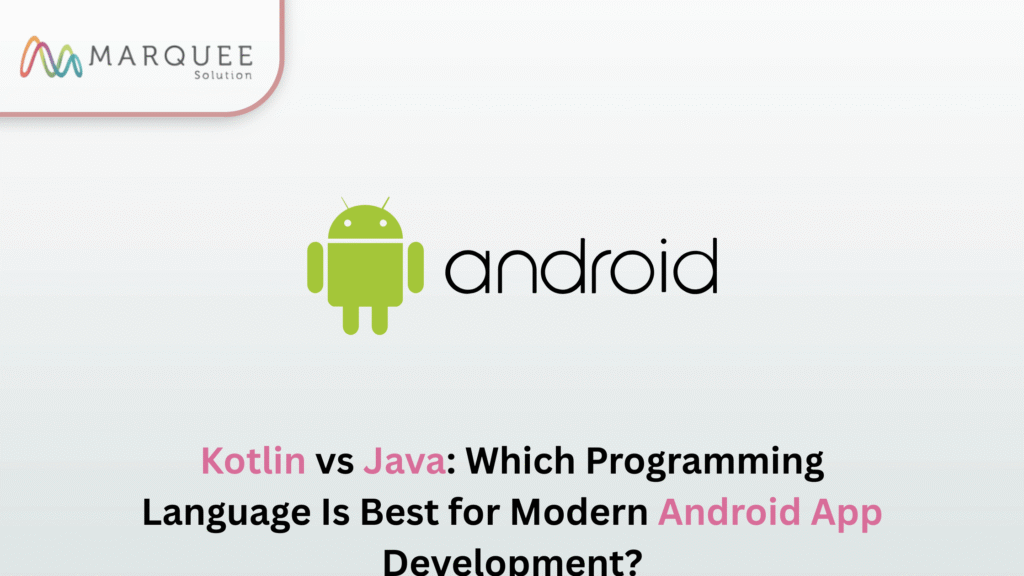With a global footprint of more than 2.5 billion active users, Android continues to dominate the mobile operating system market. Its flexibility, device versatility, affordability, and open-source nature make it the preferred OS for consumers and businesses worldwide. For entrepreneurs, startups, and organizations planning to launch mobile solutions, Android becomes a profitable choice due to its huge audience reach and ecosystem diversity. However, one of the most crucial decisions to make before beginning development is selecting the right programming language, and the long-standing debate is Kotlin vs Java.Both programming languages are widely accepted and officially supported by Google for
Android Development. While Java is known for its maturity and reliability, Kotlin is celebrated for its modern syntax and productivity enhancements. Choosing between them can impact development speed, code maintainability, scalability, and long-term support. This blog explores each language in detail, including features, strengths, performance, community ecosystem, and the ideal use cases for making an informed decision.
What is Kotlin? A Modern, Developer-Centric Language
Kotlin is a statically-typed, open-source programming language created by JetBrains and officially introduced in 2011. It was developed to address real-world development challenges, including verbosity, null pointer issues, and the lack of modern programming techniques prevalent in Java.Kotlin is interoperable with Java, meaning developers can use both languages in the same codebase seamlessly. While it powers native Android projects just like a
React Native Mobile Application focuses on cross-platform delivery, Kotlin remains dedicated to fully native performance and efficiency. Google announced Kotlin as an officially supported Android language in 2017, and as of today, it is the preferred choice for new Android app development.
Key Strengths of Kotlin
- Concise and expressive syntax
Kotlin minimizes unnecessary boilerplate code. For example, data classes, getters, and setters require significantly fewer lines of code compared to Java, leading to faster and cleaner development.
- Null-Safety built into the language
Null pointer exceptions are among the most common causes of Android app crashes. Kotlin’s type system helps eliminate them at compile-time, boosting code stability.
- Full interoperability with Java
Kotlin can call Java libraries, frameworks, and built-in classes effortlessly. This enables teams to migrate existing apps gradually rather than rewriting everything from scratch.
- Coroutines for better asynchronous programming
Kotlin Coroutines help manage background processes and network calls without complex callbacks, offering a more readable and efficient approach to handling concurrency.
- Enhanced Android Jetpack integration
Kotlin works smoothly with modern Android tools like ViewModel, LiveData, Room, and DataStore, promoting clean architecture and modular design.
Kotlin is adopted by leading global technology companies such as Uber, Coursera, Pinterest, Trello, Evernote, and Netflix, showcasing its production-level maturity.
What is Java? A Trusted, Industry-Standard Language
Java was introduced by Sun Microsystems in 1995 and is now maintained by Oracle. The language is known for being platform-independent through the Write Once, Run Anywhere (WORA) concept. Java has played a foundational role in building enterprise systems, banking applications, mission-critical software, and Android apps since the platform’s inception.
Key Strengths of Java
- Highly mature and stable ecosystem
Java has existed for more than 25 years, making it one of the most reliable programming languages with extensive documentation, tutorials, and community support.
- Massive developer availability
Since Java is taught globally in academic institutions, hiring and onboarding Java developers becomes easier and cost-efficient.
- Robust performance and memory management
Java’s Garbage Collection automatically manages memory, reducing leaks and system crashes. Combined with JIT (Just-In-Time) compilation, Android apps built with Java can run efficiently across diverse devices.
- Rich library support
Developers can access countless APIs and external libraries for almost every feature, reducing development time and increasing software quality.
- Highly secure language
Java includes built-in security mechanisms such as bytecode verification, sandboxing, and access control, which are beneficial for enterprise-level applications.
Side-by-Side Comparison: Kotlin vs Java
| Comparison Factor | Kotlin | Java |
| Syntax | Clean, concise, modern | Verbose but simple |
| Null Safety | Integrated | Manual checks required |
| Interoperability | Fully compatible with Java | Compatible but less flexible |
| Asynchronous Handling | Coroutines | Threads and callbacks |
| Learning Curve | Moderate, faster for Java devs | Easy for beginners |
| Industry Adoption | Rapidly increasing | Highly established |
| Community Support | Growing fast | Extremely large |
When Should You Choose Kotlin?
You should use Kotlin if:
- You are starting a new Android project from scratch
- You want faster development and maintainable code
- You aim to reduce bugs and runtime crashes
- You prefer modern architectural patterns
- You are building scalable and modular apps
When Should You Choose Java?
You should choose Java if:
- You are working with an existing legacy codebase
- Your team already has strong Java expertise
- You are building complex enterprise systems
- You prioritize long-term stability over rapid innovation
Final Conclusion
The Kotlin vs Java debate does not have a one-size-fits-all answer. Both are excellent languages supported by the Android ecosystem. Java shines with maturity, stability, and vast learning resources, making it ideal for long-term and enterprise-level applications. Kotlin, on the other hand, represents the future of Android development with modern syntax, enhanced productivity, and advanced safety features.For most new Android projects, Kotlin offers better development efficiency and long-term value, while Java remains the top choice for legacy modernization and large-scale systems. The most strategic approach for many teams is adopting a hybrid model, using Kotlin for new features while maintaining existing Java modules, similar to how modern cross-platform frameworks like
Flutter allow flexibility and scalability based on project requirements.



